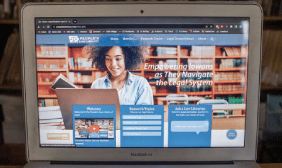Librarians at the State Library of Iowa and the University of Iowa Law Library have launched The People’s Law Library of Iowa, an online resource that helps people understand legal issues in “plain language.”
The website guides Iowans through difficult topics, such as landlord and tenant law, and then connects them with additional resources, such as finding a lawyer. For Carissa Vogel, director of the UI’s Law Library, it’s about the people’s access to justice.
“It’s great that we have like permanent access to the laws and official codes out there for people. But we need to actually find a way to meet people where they are,” Vogel said.
Creating this sort of site was a recommendation of the Iowa Access to Justice Commission created by the Iowa Supreme Court in 2016. The commissioners wanted to emulate the easy-to-understand law website offered by other states, specifically The People’s Law Library of Maryland, which has been operational for over 20 years. But without funding, an Iowa equivalent remained aspirational.
It was federal dollars from the American Rescue Plan Act (ARPA) in 2021 that finally provided funding for the site. With libraries across the state closed because of COVID-19, many people couldn’t find information they needed.
“Navigating anything within any type of government—whether it’s local, state or federal—is intimidating, often confusing, and sort of like, ‘I don’t know where to start,’” said Michael Scott, a state librarian at the State Library of Iowa.
These grant funds created the opportunity to address access issues during the lockdown by strengthening digital inclusion and equity. These online resources also help Iowans who do not live near a law library, and law librarians who cannot come into an office because of illness.
The People’s Law Library can also assist with legal problems created by COVID-19. If someone lost their job during the pandemic, cannot pay their rent and faces eviction, the website can inform them about their rights as a tenant and funnel them towards existing organizations like Iowa Legal Aid.
After securing funding, Scott contacted Vogel in July 2021, and the two began building the framework for the site. Vogel remembers telling Scott they had ambitious goals of the online library, but it was possible.
“I think you’re looking for a unicorn to try to create this thing, and I think you need like a herd of unicorns. And I have that available,” Vogel said.
The approvals and paperwork were finished in December, which was followed by nine months of “pretty intense work” to meet the launch date on Sept. 30.
“We’ve been staring at the site for a long time, and we’re super excited that other people are finally seeing it too,” she said.
The site was designed to be as user-friendly as possible. There are videos that explain how to navigate and explore its features. People who know little to nothing about the law should be able to find answers they need.
“I think this is going to be a great resource particularly for those folks who may either be new to legal information or have had very limited experience with seeking out legal information,” Scott said. “To me, the biggest piece is the access.”
The site currently features three main research topics: consumer law, which includes housing, utilities and student loans; family law like name and legal identity, marriage, divorce and parental rights; and landlord/tenant law, like leases, evictions and housing discrimination.
Vogel and Scott plan to add at least three more research topics every year, for a total of 15 to 20 topics. The next three will most likely be labor and employment, immigration and veteran’s affairs. The Maryland counterpart has 13 legal topics, including criminal, domestic violence, education and more.
“This isn’t the end, this is only the beginning,” Scott said. “The work is never done.”
They borrowed a legal glossary from the Iowa Judicial Branch and expanded it to include simple definitions of nearly 150 terms. The definitions are embedded on each page, so visitors can click on the underlined words and see its meaning without leaving the page.
Legal language is often opaque and inscrutable, Vogel said. And this can prevent people from understanding the problems they face and how to address them.
“There are some terms that are legally defined, and you can’t really define them in any other way,” she explained. “Or you actually need to know what the magic words are, because that unlocks a form, or a next step of question.”
The site also has a quick escape feature that takes users to an innocuous page. This is helpful for people who are in abusive relationships, for example, and need to search out resources but are concerned someone might be watching them.
If people haven’t found an answer to their question, or are still confused after reading the information the site provides, there is a chat feature to connect them with librarians and a form allowing them to submit questions.
“What I’m really excited about is hearing from people themselves, right, and actually learning from them,” Vogul said. “We’re really trying to partner more with people to help this be an even better, richer experience.”
Vogul said he hopes this will help people “take the next step,” whether that’s finding a lawyer or contacting another organization. In the meantime, the work continues to optimize the People’s Law Library and add more information.
“How do we get someone from a space of, ‘There is something that has happened to me,’ to, ‘I now feel empowered with some information on the next steps I have to take’?” she said. “I think that is a huge and one of the best things that we can do as libraries.”




